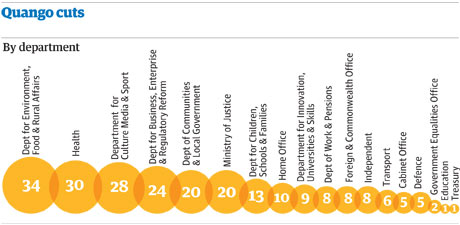
Introduction
Quangos, or quasi-autonomous non-governmental organisations, play a crucial role in the governance of the United Kingdom. While they operate independently, these agencies are established by the government to carry out specific functions and deliver public services. Understanding the significance of quangos is vital, especially in the context of current public sector reforms and budgetary challenges that focus on efficiency and effectiveness.
What are Quangos?
Quangos do not have a precise legal definition, but they typically consist of bodies that operate independently from government departments while receiving public funding. They are responsible for a wide array of functions, from health and education to environmental regulation and arts funding. Examples of well-known quangos include the Arts Council England and the Environment Agency.
The Current Landscape of Quangos
Amid ongoing discussions about public spending, the relevance and performance of quangos have come under increased scrutiny. Recent data from the UK Government reveals that there are over 1,000 quangos operating in various capacities. These organisations collectively employ around 150,000 people and manage budgets totalling tens of billions of pounds.
In the 2023 fiscal reports, it was suggested that quangos could become subject to greater oversight and accountability, following accusations of inefficiency and lack of transparency. The Public Accounts Committee and various watchdogs have called for more rigorous evaluations to ensure taxpayer money is spent efficiently, pointing to several quangos that have come under fire for their operational practices.
The Future of Quangos
As the government braces for potential spending cuts, the future of quangos is uncertain. Analysts suggest that while some may be streamlined, others could be given increased responsibilities, especially in areas where local governance is crucial. The prospect of merging smaller, related quangos into larger bodies has also been proposed, aiming to reduce duplication of services and enhance service delivery.
Conclusion
Quangos are an integral part of the UK’s public sector landscape, serving needs that are difficult for the central government to manage directly. As challenges surrounding public expenditure and calls for accountability grow louder, the importance of quangos will likely evolve in response. Stakeholders, including citizens and government agencies, must stay informed about these changes, as they can directly impact the delivery of vital services. It is essential for the future of public service provision that quangos retain the necessary independence while being held accountable for their actions and expenditures.
You may also like

The Important Role of Government in Modern Society

Understanding the Current Political Landscape in the UK

The UKIP Party: Recent Developments and Future Outlook
SEARCH
LAST NEWS
- Remembering Wendy Richard: The Promise to Co-Star Natalie Cassidy
- How Did Anglian Water Achieve an ‘Essentials’ Rating for Mental Health Accessibility?
- Shai Hope Leads West Indies in T20 World Cup Clash Against South Africa
- What We Know About Weston McKennie: Future at Juventus and Past at Leeds
- What We Know About the Upcoming Live Nation Antitrust Trial